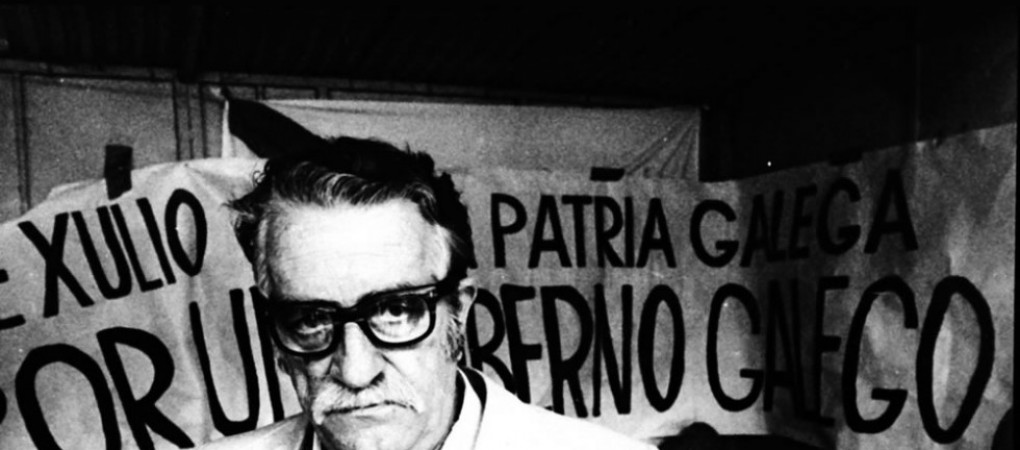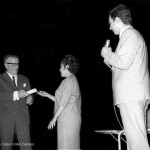1966-1973 Caracas
1912-1936 1936-1940 1940-1950 1950-1966 1966-1973 1973-1979
CARACAS: THE HARD EXILE
Sometimes disguised as “migratory adventure” or similar terms, Celso Emilio Ferreiro’s exit towards America was, in fact, the only chance he had after feeling very nearly the breath of persecution of the repressive forces of Franco’s dictatorship. He relates it transparently in a personal letter to Camilo Díaz in which he explains why he accepted the position of cultural activist in the Hermandad Gallega of Caracas.
However his friends form an organizing committee to prepare a farewell tribute. This way they meet Luis Soto y Xosé Luis Méndez Ferrín, representing the UPG, and Xesús Alonso Montero, spokesman in the PC board. They all agree to use the lunch on honour to Celso Emilio tobe an important act of protest against the Franco’s government decision to flood the fertile valleys of Castrelo de Miño and Ventosea in favor of FENOSA’s projects.
On Sunday, the 15th of May, 1966 the lunch celebrates in the ground floor of Hotel Roma in Ourense. 250 guests take part, and 1,250 adhesions are received. Ramon Otero Pedrayo, Antón Tovar, Eduardo Blanco Amor, Xosé Luis Méndez Ferrín or Emilio Álvarez Blázquez, between others, give speeches for the occasion.
In the Hermandad Gallega of Venezuela he assumes the direction, redaction and confection of the biweekly newspaper Irmandade; the direction and orientation of the Cinema Clube of the company; the direction and draft of the radio program Sempre en Galicia; and the direction and orientation of the Castelao School of primary education.
He founds and presides from 1967 the Grupo Nós, an entity that tried to politicize the the Hermandad Gallega in a clearly nationalistic sense.
Soon after, a faction of the Hermandad in tune with the desires of the ambassador of Spain in Venezuela finishes with the revitalizing labor of the poet with the victory in a fraudulent elections.
In July, 1968 he receives official communication of his expulsion of Hermandad in a letter cosigned by the president and the general secretary.
He begins a tour that takes him from one job to another: teacher of Spanish grammar in an academy, corrector in the printer’s of an emigrated Galician… but he lose quickly this jobs because of the persecution of the directors of the Hermandad.
He obtains the Venezuelan citizenship in March, 1969 and with mediation of Antidio Cabal he gets in 1970 the post of style corrector in the Press office of the Central Information Office of president Rafael Caldera. Some executives of the Hermandad leak to Galician newspapers the false news of Celso Emilio and his son’s death, announced by La Region on March 25, 1970. In response, he publishes Viaxe ao país dos ananos (1968), which in his first part is an attack to these enriched and degraded emigrants.
The same year, he publishes in Caracas Cantigas de escarnio e maldecir, which is signed with his satirical heteronym Aristides Silveira. This work continues in Os ausentes (1973), significantly subtitled Novas cantigas de escarnio, cun introito, sete gómitos e unha náusea final, a leaflet of Alexis Vainacova – another of his pseudonyms – that is published for Ediciones Pirata when he returns to Spain.
Following this line, he publishes in spanish, despite the title, Fóronse á puñeta (1973) – signed with the name Neskezas Cokhan Mordhe, edited by the publishing house Alén of Venezuela and emerged as sarcastic farewell of the executives of the Hermandad-. He also publishes the romance Paco Pixiñas. Historia dun desleigado contada por il mesmo. Romance de Arístides Silveira cun limiar tirado dos proverbios do Conde de Vimioso (o Vello) e epílogo de Celso Emilio Ferreiro (1970), published in Ediciós do Castro by Isaac Díaz Pardo.
The book of burlesque epitaphs Cemiterio Privado (1973) belongs to this cycle. It was published by a group of young nationalists who were directing Ediciós Roi Xordo in Geneva.
This incendiary lyrical vein confirmed to Celso Emilio as the poet of preference among the singer-songwriters who were appearing in Galicia as musically rebellious voices. So, he has a leading role in the “Nova Canción Galega”, which helped to spread furthermore his poetry.
He publishes Terra de ningures in 1969, in the collection Val de Lemos of the publishing house Xistral, which directed in Monforte the poet Manuel Maria. It is a book of poems signed and dated in different countries he had travelled to.
In 1970 he publishes “13 poemas iracundos y una canción inesperada” in September 2, 1970, an offprint of the magazine of Caracas Expediente, a publication directed for Antidio Cabal. He obtains the IV International Prize of Poetry Álamo of Salamanca, that publishes his work Antipoemas, but without ten compositions. Celso Emilio will publish the ten “expurgated” poems the same year in Caracas in the work Forbidden poems: Diez poemas no incluidos en el libro «Antipoemas» por causas no imputables a la voluntad del autor.
He publishes the book of short stories A fronteira infinda, in Ediciones Castrelos of Vigo, in the collection Moucho, in 1972. In this work he includes autobiographical elements.
Celso Emilio develops a prominent political activity in Caracas within the UPG as person in charge of the Exterior Relations Secretary of this party, and he publishes Terra e tempo for a time. Also, he establishes contacts with the Consello de Galiza in Buenos Aires, requesting a credential to support him as person authorized to coordinate a delegation of organism in Venezuela, credential that would be granted to him.
In these years, in the Xogos Florais do Idioma Galego of Buenos Aires in 1968, he wins the Prize Rosalía of Castro to the best “Canto á muller galega” (Song to the Galician woman) for his poem “Miña Matria Galiza”. In the I Xogos Guimarães’s Florais Minho-Galaicos of Guimarães, in 1970, he is winner in the modality of poetry and narrative.
Related poem: 1
solemnemente digo:
Esilado na miña propia Terra,
canso de ollar as mesmas torres sempre,
farto de ver as mesmas caliveras
–fasquía de vivir pecho nun sótano–
quixen seguir o rumbo do meu pobo,
o ésodo sin fin dos emigrantes.
Troquéi os lares patrios
polos eidos alleos
e percorrín o mundo coma un nómada
compañeiro do vento e das estrelas.
Camiñéi á ventura,
naveguéi día e noite, mar adentro,
paséi as illas páledas,
vin o peixe voador i os arroaces,
deixéi á esquerda as augas dos Sargazos,
cheguéi ás moles praias do mar quente,
do eterno vrau vestido de bikini,
choutando pola area.
(Veda Woodlake decía quedamente:
“O mar non é un camiño innumerábel;
é un gran corazón abandoado”.)
Non quixen escoitar
teus cantos de sereia,
Veda Woodlake. Buscaba
aos meu irmáus perdidos. Rosalía
choróu por iles bágoas de esperanza.
Curros berróu os seus trenos inmorrentes
i eu mesmo un día dixen (mália a hora!)
que os nosos emigrantes
“erguen seus urros ceibos e labouran
cos músculos encheitos de esperanzas
lonxe da patria
cuberta de cadeas e de tombas.”










